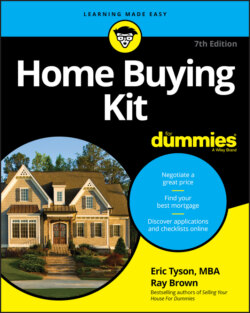Читать книгу Home Buying Kit For Dummies - Eric Tyson - Страница 18
Renting advantages
ОглавлениеBuying and owning a home throughout most of your adult life makes good financial and personal sense for most people — but not all people and not at all times. Renting works better for some people. The benefits of renting are many:
Simplicity: Yes, searching for a rental unit that meets your needs can take more than a few days (especially if you’re in a tight rental market), but it should be a heck of a lot easier than finding a place to buy. When you buy, you must line up financing, conduct inspections, and deal with myriad other issues that renters never have to face. When you do it right, finding and buying a good home can be a time-consuming pain in the posterior.
Convenience: After you find and move into your rental, your landlord is responsible for the never-ending task of property maintenance and upkeep. Buildings and appliances age, and bad stuff happens: Fuses blow, plumbing backs up, heaters break in the middle of winter, roofs spring leaks during record-breaking rainfalls, trees come crashing down during windstorms. The list goes on and on and on. As a renter, you can kick back in the old recliner with your feet up, a glass of wine in one hand and the remote control in the other, and say, “Ahhhhh, the joys of not being part of the landed gentry!”
Flexibility: If you’re the footloose and fancy-free type, you dislike feeling tied down. With a rental, as long as your lease allows (and most leases don’t run longer than a year), you can move on. As a homeowner, if you want to move, you must deal with the significant chores of selling your home or finding a tenant to rent it.
Increased liquidity: Unless you’re the beneficiary of a large inheritance or work at a high-paying job, you’ll probably be financially stretched when you buy your first home. Coming up with the down payment and closing costs usually cleans out most people’s financial reserves. In addition, when you buy a home, you must meet your monthly mortgage payments, property taxes, insurance, and maintenance and repair expenses. As a renter, you can keep your extra cash to yourself, and budgeting is also easier without the upkeep-expense surprises that homeowners enjoy, such as the sudden urge to replace a leaking roof or old furnace. You don’t need to buy a home to cut your taxes. Should you have access to a retirement account such as a 401(k), 403(b), or SEP-IRA plan (see Chapter 2), you can slash your taxes while you save and invest your extra cash as a renter. So saving on taxes shouldn’t be the sole motivation for you to buy a home.
Better diversification: Many homeowners who are financially stretched have the bulk of their wealth tied up in their homes. As a renter, you can invest your money in a variety of sound investments, such as stocks, bonds, and perhaps your own small business. You can even invest a small amount of money in real estate through stocks or mutual funds if you want (see Chapter 16). Over the long term, the stock market has produced comparable rates of return to investing in the real estate market.
Maybe lower cost: If you live in an area where home prices have rocketed ahead much faster than rental rates, real estate may be overpriced and not a good buy. In Chapter 4, we explain how to compare the cost of owning to the cost of renting in your area and how to spot a potentially overpriced real estate market. Renting should also be cheaper than buying if you expect to move soon. Buying and selling property costs big bucks. With real estate agent commissions, loan fees, title insurance, inspections, and all sorts of other costs, your property must appreciate approximately 15 percent just for you to break even and recoup these costs. Therefore, buying property that you don’t expect to hold onto for at least three (and preferably five or more) years doesn’t make much economic sense. Although you may sometimes experience appreciation in excess of 15 percent over a year or two, most of the time, you won’t. If you’re counting on such high appreciation, you’re setting yourself up for disappointment.
